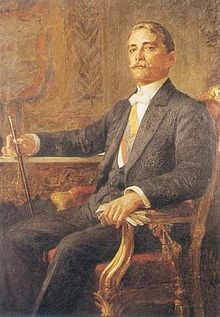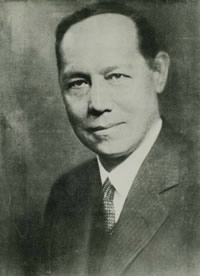Carlos Eugenio Restrepo
Carlos Eugenio Restrepo Restrepo | |
|---|---|
 | |
| 12th President of Colombia | |
| In office August 7, 1910 – August 7, 1914 | |
| Preceded by | Ramón Gonzalez Valencia |
| Succeeded by | José Vicente Concha |
| Personal details | |
| Born | September 12, 1867 Medellin, Antioquia |
| Died | July 6, 1937 Medellin, Antioquia |
| Nationality | Colombian |
| Spouse | Isabel Gaviria Duque |
Early Life
Family
Carlos Eugenio Restrepo Restrepo was born in the home of Pedro Antonio Restrepo, a lawyer and nephew of José Félix de Restrepo, and Cruzana Restrepo Jaramillo. He had two brothers, Nicanor, a merchant, and Juan María, a distinguished theologian at the service of the Holy See.
Carlos E. Restrepo married to ’’’Isabel Gaviria Duque’’’ on April 16, 1890, together they had nine children, four boys, Carlos Ignacio, Adolfo, J. Mario, and five daughters, Tulia, Isabel, Sofía, Ana and Margarita, who married the Colombian writer and philosopher Fernando González Ochoa.
Education
Carlos Restrepo went to school in Itagüí, and Medellín; he later attended the Institute of Higher Learning in what is now the Seminario Conciliar de Medellín. He studied Law, but had to suspend his studies at the age of 18, because of the raging Civil War in 1815. He was forced to teach himself the basics while also practicing in the law firm of his father and his bussiness parter, Alejandro Botero Uribe, who would later become Minister of Interior and Justice in 1909.
Career
Law
Carlos Eugenio Restrepo quickly became an avid and respected lawyer moving up in different ranks. He worked as a Public Inspector of Education in 1888, He then became a prosecutor in the Supreme Court of Antioquía, a Judge of the lower circuit of Antioquía, and finally the Attorney General for the Department of Antioquia in 1898.
He later became a professor in the Law Department of the University of Antioquía, and also became the University’s Rector. He also participated in various charities, he helped established the Red Cross in Colombia, became president of the Society of Saint Vincent de Paul, and founded the ’’Society for the Improvement of Public Works’’ in Medellín in 1901.
Politics
He was elected to the House of Representatives of Colombia in 1909, In March 13, 1909 he founded the ’’Unión Republicana’’ or Republican Union, a political party that emphasized political reconciliation, Republican values, modernization, and a National identity. This political movement had the support of prominent members of both Conservatives and Liberals like, José Vicente Concha, Pedro Nel Ospina and Miguel Abadía Méndez, from the Colombian Conservative Party and Nicolás Esguerra, Benjamín Herrera and Enrique Olaya Herrera from the Colombian Liberal Party[1].
Writing and journalism
Presidency 1910-1914

Elections
On July 15, 1910 The National Assembly elected the 42 year old Carlos Eugenio Restrepo Restrepo to assume the Presidency of Colombia. Restrepo had won the election with 23 votes in his favor against 18 votes for his contender José Vicente Concha. He became the first Antioquian to be elected to preside over the country. His victory was a surprise to many, as many considered him just a reported, and more surprising yet, was his victory on both sides of the aisle winning the majority on both parties.
Policies
Foreign Policy

President Restrepo named Enrique Olaya Herrera as his Minister of Foreign Affaire in accordance with Decree Nº 699 of August 7, 1910[2].
Restrepo’s view on the impending military action of the United States in Mexico was [3]
Post-presidency
He was named Minister of the Interior and Justice and Ambassador to the Holy See, during the presidency of his sucessor Enrique Olaya Herrera[4]
Death and legacy
His Presidency was seen as a great work of political conciliation and had a high support in Congress and the rest of the country. He left the presidency with the with a high approval rating and his presidency is seen as an efficient and fair mandate[5]. He was regarded as one of the most progressive and modern South American statesmen and a lawyer with wide experience and an author of high reputation[6].
See also
References
- ^ http://www.presidencia.gov.co/prensa_new/historia/2.htm Website of the Presidency of Colombia
- ^ http://www.fac.mil.co/index.php?idcategoria=21893&facmil_2007=3d6c56c687b09f046f46aa0a7ebd0255 Colombian Airforce Website
- ^ http://books.google.com/books?id=hBfjRhMoL1QC&pg=PA339&dq=%22Carlos+E.+Restrepo%22&as_brr=1#PPA339,M1 Problems in Pan Americanism By Samuel Guy Inman
- ^ http://biblioteca-virtual-antioquia.udea.edu.co/authors.php?code_author=105&&author_full_name=Carlos%20E.%20Restrepo Biblioteca Virtual de Antioquia
- ^ http://www.partidoliberal.org.co/root/index.php?option=com_content&task=view&id=133&Itemid=6 Partido Liberal Colombiano
- ^ http://books.google.com/books?id=kcQBAAAAMAAJ&pg=PA413&dq=%22Carlos+E.+Restrepo%22&as_brr=1#PPA413,M1 The American Review of Reviews, Edited by Albert Shaw
Founder of the Antioquian newspaper]] La República
He was named Minister of the Interior and Justice and Ambassador to the Holy See, during the presidency of his sucessor Enrique Olaya Herrera[1]
Ministry of Foreign Affairs (Colombia)
- ^ http://biblioteca-virtual-antioquia.udea.edu.co/authors.php?code_author=105&&author_full_name=Carlos%20E.%20Restrepo Biblioteca Virtual de Antioquia
